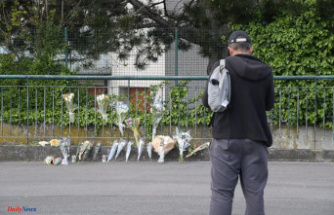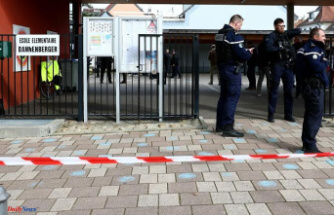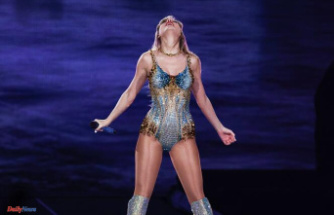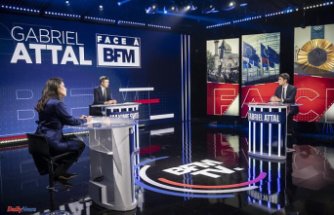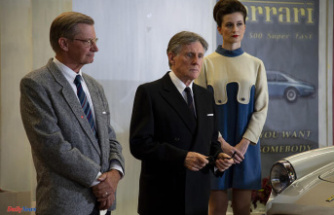System theorists could despair of a Bundt cake. If you think so. A Bundt cake says remarkably nothing at all about the state of the world. At first glance. And if you don't care about him.
After all, Guglhupf only means the form, not the content. You can fill the high-rimmed, metal thing with the cute bulges with whatever you want, biscuit, yeast, carrot potato, four-cheese dough. The fact that he ends up looking like a volcano is the most explosive thing about him. If you think so.
If you can learn something from Rita Falk and Ed Herzog's legendary film adaptations of their legendary supposed regional crime stories about the village gendarme Franz Eberhofer, who creates order in Niederkaltenkirchen in Lower Bavaria, the "Winter Potato Dumplings", "Kaiserschmarrndrama", "Grießnockerlaffäre" or just - to finally get to the topic now “Guglhupfgeschwader” are called, then, firstly, that we are all Niederkaltenkirchen and, secondly, that there is probably no recipe in Falk’s grandma’s cookbook that Falk supplies with the title that cannot be reinterpreted as a system-theoretical description of German society as a whole.
The inclined regional crime readers and “How to sell drugs online”, “Dark” and “The Disappearance” series viewers of course know that the numerous German provinces have now almost caught up with the few German metropolises in terms of criminal dangerousness and usability for series a long time ago.
If you then try, as Ed Herzog does in the Eberhofer films, to speak a kind of sober Bavarian that refrains from all boisterousness, all bad leatheriness, then you get stories that are extremely timeless and amazingly placeless.
They could play in Brandenburg, somewhere on Lake Mecklenburg or in the Vulkaneifel. That brings us back to Guglhupf and the squadron that gave its name to the eighth Eberhofer film that was long prevented by Corona.
Village policeman Franz Eberhofer can't rest. Something is always going on, even in the deepest Bavarian province of Niederkaltenkirchen. A film based on the bestseller of the same name by Rita Falk.
What: Constantin Film
Now we could make it insanely easy for ourselves and fill the rest of the space allotted to us by telling what happens in Guglhupfgeschwader. That wouldn't be very difficult for us.
Niederkaltenkirchen, this street village that likes to be filmed deserted (which in real life is probably called Frontenhausen, from which one could also build a system theory), explodes like a volcano of sub- and side stories, all of which owe their existence to the large family of characters that have become dear to them who even millions of non-Bavarians go to the cinema and at some point later turn on the television.
There's a good reason for baking Guglhupf in Niederkaltenkirchen. It's Franz's birthday from Eberhof. And ten year service anniversary. What the Secretary of State has announced. The village music should play. There should be coffee and cake.
A squadron of Guglhupfen has announced itself. Grandma alone baked five. But they don't survive the finale of the film in whole hops. They're dying of blue bean poisoning.
This has to do with the lottery fever - 17 million are in the jackpot, which makes the Eberhofer grandma buy tickets worth 503.50 euros. And with the mafia. And the corrupt police of Hauptkaltenkirchen. And the Lotto Otto.
He runs a Toto-Lotto tobacco shop with his mom on the market square in Niederkaltenkirchen, but he's not exactly the brightest candle on the Guglhupf. So far, nobody has noticed that he looks quite similar to Eberhofer-Franz, which is also due to the fact that he has never really appeared in the Eberhofer cosmos, which meanwhile has as many supporting characters as the Avengers.
The Eberhofer grandma has hardly entered the lottery shop when a ball flies around Lotto Otto's ears. Not much later, the store explodes. Lotto-Otto's mother, quite extensive and rather keen on movement, dies in the process. Otto (Johannes Berzl), oddly enough he's been missing a phalanx recently, has probably teamed up with the wrong people.
To briefly summarize the further entanglements: Flötzinger (Daniel Christensen), gas-water-shit-plumbing expert and Niederkaltenkirchen headband leader, imagines himself to be a winner of millions for a short time and goes crazy, among other things with an orange-red Lamborghini in the Eberhofer-Kreisel, which is now called Frontenhausen legendary roundabout.
Birkenberger-Rudi (Simon Schwarz) is jealous of Eberhofer because of his anniversary, but gets involved with Theresa (Stefanie Rheinsberger), an esoteric who loves to be hugged. Susi, the Eberhofer child's mother and on-off relationship, becomes posthumously jealous of Lotto-Otto's mother, so to speak.
Eberhofer-Franz has to go to couples therapy. The Czech gambling mafia strikes. An almost straightforward crime story is told. And before you can't stop being amazed, bullets are flying around your ears like they haven't been since "Wild Bunch". There are also Guglhupfe among the victims.
What do you learn from the shelling from the "Guglhupfgeschwader"? That Leberkäs consists of tendons, gristle and fat, but definitely not meat. Winning the lottery doesn't make you happy. Surviving the sight of the worst knickers in movie history. That you can actually make grandiose cinema films from sometimes silly regional thrillers.
With an enchanting image idea (sloping, inflated heads, frighteningly empty streets). With unabashed decor (old cars, rancid rooms, rotten wallpaper). With shrill, post-Biermöslblosn-like music. With actors who like themselves, who like what they do. who like each other. Whose fun in the game makes up the main fun in looking.
Theoretically, the next step would be the “Weißwust connection”. Or the “venison ragout rendezvous”. We have a recipe for that. With cloves. Of course, it would be nothing for vegetarians.


